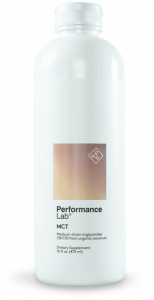Summary: Best MCT Oil of 2026
Here’s the official Nootropic Geek guide on the best MCT oil of 2026. Medium-chain triglycerides (MCTs) are a class of beneficial fats that provide fast-acting energy fuel for brainpower. As an energy alternative to glucose, MCT oil is a powerful tool for those looking to burn fat via ketosis and/or stay committed to an intermittent fasting regimen. But not all MCT oil supplements are equal, which is why I’m highlighting the best MCT oil supplement here: Performance Lab MCT.
As a standalone supplement, Performance Lab MCT works great. But for maximum brain health benefits, it’s best to stack this brain fuel oil with other comprehensive nootropic stacks. Hit the following link to see some of my favorite nootropic supplements:
Get the Best Deal on Performance Lab MCT here.
Page Contents
Ultimate Beginner’s Guide: What is MCT Oil?
Simply put: medium-chain triglycerides, or MCTs, are a class of beneficial fats typically associated with coconut oil. (Because coconut oil is full of MCTs — duh!) While we typically don’t think of fats as “beneficial,” especially saturated fats (which is what MCTs are), MCTs uniquely benefit the brain and body by providing a natural, organic source of fast-acting energy that’s both non-stimulatory and non-glucose.
Related:
Best Nootropic Bars: Effective, Convenient Brain Food
As an alternative to glucose energy, the body’s primary source of energy, MCT oil can help you maintain elevated levels of brainpower (and other positive metabolic effects) in the absence of glucose (read: carbohydrate) energy. This, of course, makes MCT oil incredible valuable to those chasing the keto diet and/or intermittent fasting.
How Does MCT Oil Work?
Essentially, MCT oil works by converting in the body to ketones, a fat-sourced energy fuel that powers cognition (again) in the absence of glucose. This explains the thinking behind the keto diet: by avoiding excess carbohydrate consumption, the keto dieter encourages the body to go into a state of fat-burning ketosis — a metabolic state in which stored fat converts into energy-fueling ketones.
And so as a ketone precursor, MCT oil essentially offers keto-friendly nutritional energy that helps sustain cognitive energy, focus, and intensity without breaking the metabolic benefits of ketosis. It’s really simple as that: MCT oil works by delivering organic keto-friendly brain fuel.
Coconut Oil vs. MCT Oil: What’s the Difference?
Coconut oil has medium-chain triglycerides (MCTs), but not all MCT oil comes from coconut oil –though, to be honest, they all probably should. Coconut-sourced MCTs are the beeesssttt.
Coconut oil, located in the kernel or “flesh” of coconut, contains healthy mixture roughly comprised of 90% saturated fats (both MCTs and LCTs), 5-8% monounsaturated oleic acid (omega-9), and 1% polyunsaturated linoleic acid (omega-6). Of course, the omegas are pretty great for you, but the key thing here is the saturated fat content — specifically the MCTs.
While the LCTs (long-chain triglycerides) located in coconut oil aren’t exactly awful for you, they do tend to be stored as fat rather instead of being used for on-the-spot energy fuel, as is the case with coconut’s MCT content. This makes LCTs somewhat of a risk factor for weight gain and cardiometabolic issues, whereas MCT oil seems to help on these fronts.
What About Omega-3 Fatty Acids?
Similar to MCT oil, omega-3 fatty acids are a class of beneficial fats. However, whereas MCT oil is comprised of saturated fats naturally sourced from coconuts, omega-3s are polyunsaturated fats that have their natural sources in oily fish foods (salmon, mackerel, herring, etc.) as well as in several types of seeds. The three omega-3s are alpha-linolenic acid (ALA), docosahexaenoic acid (DHA), and eicosapentaenoic acid (EPA) — and of these three, DHA and EPA are considered most important. Pairing MCT oil with omega-3s provides you with fast-acting brain fuel (MCTs) and long-lasting brain health support (omega-3s) — just an all-around smart and powerful combo.
Read my Performance Lab Omega-3 review here.
Coconut Oil vs. MCT Oil: Which is Better?
Of all the fatty acids in coconut oil, the medium-chain triglycerides are the best. This is why we extract, purify, and concentrate MCTs from coconuts and present them as their own standalone oil supplement. And so with that in mind: by encompassing only the best part of coconut oil, MCT oil is better than coconut oil.

Granted, this doesn’t mean that coconut oil is totally useless, or that you should always use MCT oil over coconut oil for every purpose. For example, coconut oil is more useful as a skincare agent than MCT oil, which is almost exclusively used as a dietary supplement and/or food condiment.
Related:
Best Sleep Supplements: Nootropics for Rest & Recovery
The Four Types of Medium-Chain Triglycerides (MCTs)
For brain health and brain energy, MCTs outperform both SCTs (short-chain triglycerides) and LCTs (long-chain triglycerides). However, not all MCTs are equal. In fact, some MCTs are better than others — but before explain which are which, let’s familiarize ourselves with each individual MCT.
Altogether, there are four types of MCTs:
- C6 – Caproic Acid
- C8 – Caprylic Acid
- C10 – Capric Acid
- C12 – Lauric Acid
Essentially, C6 (caproic acid) is the shortest MCT (with a 6-carbon chain) and C12 (lauric acid) is the longest MCT (with a 12-carbon chain). Though they do carry distinct health benefits, C6 and C12 are, respectively, a little too short and a little too long for ideal MCT bioactivity.
This is why the best MCT oil supplements focus strictly on supplying C8 and C10 — or at least they should focus strictly on these two. Because C8 is believed to be the best for ketosis, many MCT oil supplements mistakenly supply only C8, missing out on the distinct brain benefits of C10, which supports brain mitochondria metabolism.
Remember: the mitochondria is the powerhouse of the cell!
While a C8-only MCT oil is good, the best MCT oils supply both C8 and C10, the two medium-est of the medium-chain triglycerides.
What Are the Benefits of MCT Oil?
I keep saying that MCT oil provides “fast-acting energy fuel.” And while this is true (otherwise, why would I keep saying it over and over??), it’s an extreme simplification of all the immense health benefits of supplementing MCT oil.
And so, with that in mind, I’ve added below a few more key health and fitness benefits you can expect when adding MCT oil to your daily diet. Here are the different beneficial uses for MCT oil:
#1) MCT Oil for Mental Energy
Within minutes after consuming MCT oil, the medium-chain triglycerides convert into ketones, which in turn cross the blood-brain barrier (BBB) to fuel brain mitochondrial ATP energy production. All of which is to say that MCT oil (*ahem*) delivers fast-acting brain energy fuel!
Again, this is particularly helpful when in a fasted state and/or reducing your carbohydrate intake. As the primary food fuel for brain energy, glucose (a simple sugar mostly found in carbs) strongly correlates with brainpower — and even, as some research suggests, willpower. In other words, when your glucose levels decline, so too does your brainpower, which is a problem if you’re trying to cut back on carbs.
By fueling brainpower in the absence of glucose, MCT oil is an incredibly valuable and effective nootropic — one that feels like a quick energy jolt to the cranium as your brain fog lifts. Regularly supplementing MCT oil may even help improve focus and memory function.
More on Nootropics for Brain Energy.
#2) MCT Oil for Keto and Intermittent Fasting
You can’t spell “ketones” without “keto”… because, well, that’s the entire point of the keto diet: to induce ketosis, or the production of ketones! Of course, ideally, when engaged in the keto diet, the idea is to promote ketosis of the body — in other words, to convert your stored body fat into brain-and-body-fueling ketone bodies — and not necessarily to function of dietary ketones, such as those delivered via MCT oil supplement.
Yet, all the same, while mid-way through the fasting portion of your intermittent fasting regimen and/or keto diet, it can be difficult to sustain high levels of productivity as your energy levels begin to dwindle. Naturally, you’ll want to reach for that Clif Bar, but that would completely derail your ketosis. This is where MCT oil comes into play: by converting to ketones, MCT oil sustains energetic productivity without impairing your natural state of fat-burning ketosis.
More on Nootropics for Intermittent Fasting.
#3) MCT Oil for Athletic Performance
Brainpower and ketosis — of course, it’s nice to generally sustain a fat-burning state that’s also conducive to heightened mental performance. (I say this as if it’s not a really nice thing, because it is really, really nice.) But if you can also leverage MCT oil’s energy-promotion in service of heightened athletic performance, that would be even better — both for additional fat-burning and for your overall health and fitness.
Well, that’s exactly what taking MCT oil prior to exercise can do. (Let’s call it “pre-workout MCT.”) Research suggests that by boosting mitochondrial biogenesis and metabolism, MCT oil supplementation can help enhance exercise endurance, essentially allowing you to work out harder for longer without bottoming out, energy-wise.
More on Nootropics for Exercise.
Best MCT Oil Supplement to Buy: Performance Lab® MCT
 Easily the best MCT oil supplement, Performance Lab MCT is my go-to MCT oil for a daily brain health/energy boost. It’s no exaggeration to say that I’m eager every morning to get out of bed to rev up the coffee-maker and toss some of this MCT oil in my coffee cup (in addition to Rhodiola Rosea, Lion’s Mane Mushroom, and other various beneficial nootropics).
Easily the best MCT oil supplement, Performance Lab MCT is my go-to MCT oil for a daily brain health/energy boost. It’s no exaggeration to say that I’m eager every morning to get out of bed to rev up the coffee-maker and toss some of this MCT oil in my coffee cup (in addition to Rhodiola Rosea, Lion’s Mane Mushroom, and other various beneficial nootropics).
Not only does this MCT oil taste good (and clean) but it feels really good, too. That early-morning hunger-related anxiety immediately dissipates as I drink down my Performance Lab MCT.
But what is it about Performance Lab MCT that sets it apart from other MCT oil supplements? Two things:
- Purity: Performance Lab MCT supplies only C8+C10 MCTs at a 60:40 ratio without any impurities or unwanted MCTs (or LCTs for that matter).
- Quality: the MCTs here are sourced from 100% organic coconuts using hexane-free eco-friendly technology.
If you do a side-by-side taste comparison with Performance Lab MCT and any standard MCT oil supplement, you can easily taste the difference. Performance Lab MCT tastes cleaner and greener than any other MCT oil — and it very well might be my favorite product from Performance Lab’s extensive line of supplements.
Get the Best Deal on Performance Lab MCT here.
Unique Features
Decent coconut oil supplies 55% MCT oil high in the less-effective C12 MCT, whereas a good MCT oil supplement supplies 100% MCT oil, albeit often with impurities and hydrogenated unhealthy trans fats sourced from cheap palm oil. Performance Lab MCT, on the other hand, qualifies as the best MCT oil for having a pure supply of the two best MCTs: C8 + C10 — minus everything else.
Potency & Quality
Performance Lab MCT provides a clean, pure supply of beneficial C8+C10 MCTs that are sourced from 100% organic non-GMO coconuts via a 3X-distillation, cold-extraction process with hexane-free technology. All of which is to say that Performance Lab MCT oil is pretty damn potent and all-around high-quality stuff!
Extra Geek Points
Trust me on this: Performance Lab MCT lasts you for quite awhile. Though the serving count is 31 and though I take this supplement every morning with my coffee, it lasts me for a long time. When I buy Performance Lab MCT, I get the “Buy 3, Get 1 Free” bulk order option which is not only the best value option but gets you a lot of long-lasting MCT oil. Easily the best value MCT oil you can buy.
Final Thoughts
My Conclusion on the Best MCT Oil Supplement of 2026
For many nootropic newcomers, the starting off point is the simple stack combo of mixing caffeine with L-theanine — typically by adding L-theanine to one’s morning coffee. However, whether you’re a nootropic newb or a bio-hacking veteran, it’s an even smarter idea to toss in a little MCT oil in your coffee cup as well. (Not to mention it’s incredibly easy, yet still with a ride range of health and fitness benefits.)
While the “bulletproof coffee” concept has popularized the trend of adding butter and coconut oil to one’s coffee, I’d suggest that this recipe can be greatly simplified and improved by simply adding Performance Lab MCT to your morning coffee — in addition to your preferred nootropic ingredients of choice.
Organic, non-GMO, additive-free — Performance Lab MCT easily delivers one of the cleanest and greenest MCT oils that money can buy. I’m a big fan of it and can certainly recommend it to all my readers — no matter your level of nootropic interest or dietary lifestyle. Certainly give it a try if you’re in the market for a healthy, safe, daily MCT oil.

